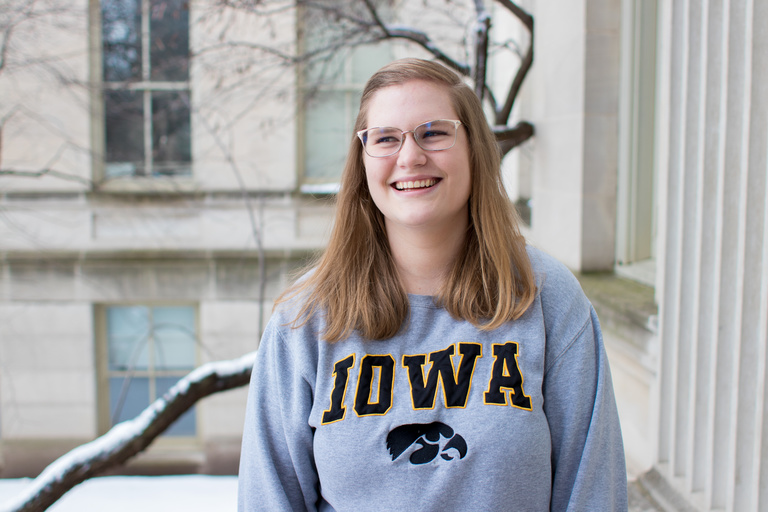
Name: Rachel Maggi
Hometown: Kohler, Wisconsin
Type of Fulbright award: Fulbright Study/Research Award in Public Health to India
Degree and field of study: BA international studies (South Asian and East Asian studies), minor in global health studies, sustainability certificate
Research: I will be conducting a qualitative focus group and individual interview-based research to investigate breast and cervical cancer knowledge and perceptions in the southwest state of Karnataka, India. I will be working with two host affiliations: Dr. Johnson and Dr. Agrawal at St. John’s National Academy of Health Sciences in urban Bangalore and Dr. Padmaja at the Vivekananda Memorial Hospital (a unit of the Swami Vivekananda Youth Movement, an NGO based in Mysore) in rural Saragur.
What drew you to this field of study?
In December 2014-January 2015 I traveled to Udaipur, Rajasthan, as a part of the University of Iowa India Winterim Study Abroad Program. We studied high-efficiency cookstove use in the communities of Udaipur, Gogunda, and Karech. As a part of the study, we discussed household air pollution and the women at-risk for chronic respiratory diseases as the result of concentrated smoke inhalation. I would consider this my first experience with global health. The following spring semester I read the book Mountains Beyond Mountains: The Quest of Dr. Paul Farmer, A Man Who Would Cure the World and attended the 12th Annual Unite For Sight Global Health and Innovation Conference at Yale University, which solidified my interest in global health. In June 2015, I returned to India as a research intern with the Swami Vivekananda Youth Movement (SVYM) in Mysore to study human and social capital concepts at their rural hospitals and schools. From all of these experiences, I became determined to return to India to conduct my own global health research. I picked this topic to focus on because of my interest surrounding women’s health in India, and in general, I don’t believe there is enough focus on non-communicable diseases (such as cancer) in the field of global health.
How do you envision this will change your life?
The longer I have studied global health, the more I understand the importance of forming lasting relationships with the communities you want to do research with. This Fulbright award will allow me to spend extended periods of time working with the personnel at St. John’s National Academy of Health Sciences and SVYM, as well as the communities in their catchment areas. The connections I make during this research period will hopefully allow me to return to these communities to conduct follow-up research projects during my future MPH and Ph.D. studies and assist in more projects based on community need.
What advice do you have for future students interested in pursuing a Fulbright award?
The Fulbright application process is really tough, so don’t do it alone! Find a Fulbright faculty mentor who is willing to work closely with you on your essay drafts. Without the input of Dr. Christopher Squier, with whom I met with once a week for the majority of last summer, my essays would not have been nearly as cohesive or effective. Also, if you plan on doing research, talk with your professors about people/institutions they have connections with and reach out as soon as possible! You don’t want to find yourself at the deadline without a letter of affiliation.
What campus resources were most helpful to you when you applied for a Fulbright?
In general, the University of Iowa has a community that really supports Fulbright applicants. If you are thinking about applying for a Fulbright, make sure to attend as many information sessions and writing workshops as possible! It will help you better understand the application process and make connections to Fulbright faculty mentors, past/present awardees, and other applicants to lean on for support and advice.
Are there any individuals you'd like to thank for their investment in this process?
There so many individuals who have helped me through the Fulbright process. Dr. Christopher Squier who wrote me a recommendation letter and invested so much time into helping me craft my essays. I cannot thank him enough for his support and dedication as he continues to mentor me through my honors thesis. I would like to also thank Karmen Berger who has been a guiding force throughout my entire career as an international studies student; Ed Zastrow who wrote me a wonderful recommendation and helped instill in me a greater sense of self-confidence over the three years I have interned under him at the Iowa City Foreign Relations Council; Dr. William Story who also wrote me a recommendation and who connected me to my host affiliation with St. John's National Academy of Health Sciences; and Drs. Johnson, Agrawal, and Padmaja who gave me a chance when they agreed to be my mentors during my research in India. Lastly, I would also like to thank two of my best friends, Daniel Valentin and Ashley Chong, for being an unwavering support system throughout the toughest stages of the application process.